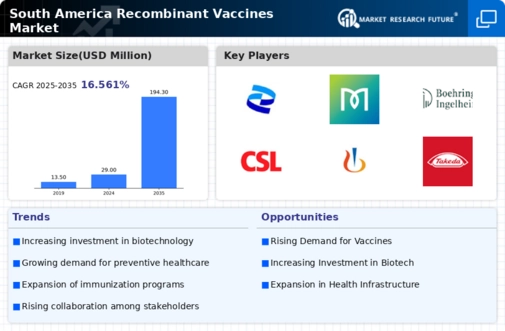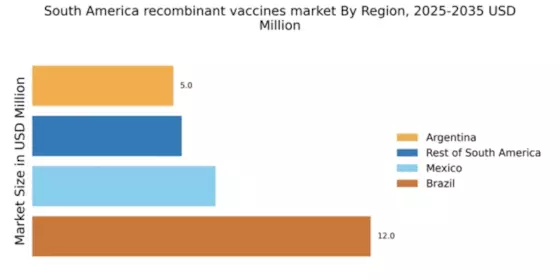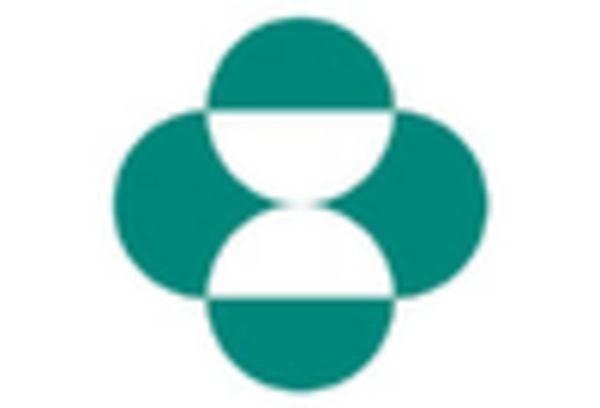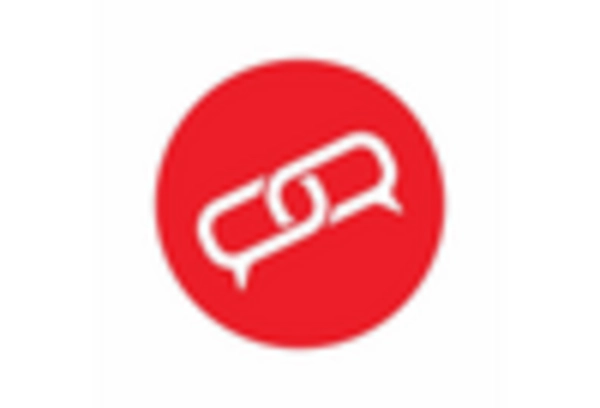Government Initiatives and Funding
Government initiatives play a pivotal role in shaping the recombinant vaccines market in South America. Various national health authorities are increasingly recognizing the importance of vaccination programs and are allocating substantial funding to support research and development in this sector. In 2025, it is estimated that government funding for vaccine development in South America will exceed $300 million, aimed at enhancing public health outcomes. These initiatives not only facilitate the development of new vaccines but also promote public awareness campaigns to encourage vaccination uptake. The proactive stance taken by governments indicates a commitment to improving health infrastructure, which is likely to bolster the recombinant vaccines market. As public health policies evolve, the support from governmental bodies is expected to create a conducive environment for the growth of recombinant vaccines.
Rising Demand for Preventive Healthcare
The increasing focus on preventive healthcare in South America is driving the recombinant vaccines market. As healthcare systems evolve, there is a notable shift towards vaccination as a primary strategy for disease prevention. This trend is underscored by a growing awareness of the benefits of immunization, which is reflected in the rising vaccination rates across various demographics. In 2025, the market for recombinant vaccines is projected to reach approximately $1.5 billion in South America, indicating a robust growth trajectory. The emphasis on preventive measures is likely to enhance the adoption of recombinant vaccines, as they offer targeted protection against infectious diseases. This shift in healthcare priorities suggests a promising outlook for the recombinant vaccines market, as stakeholders recognize the value of investing in innovative vaccine solutions.
Increasing Incidence of Infectious Diseases
The rising incidence of infectious diseases in South America is a critical factor driving the recombinant vaccines market. With the emergence of new pathogens and the resurgence of previously controlled diseases, there is an urgent need for effective vaccination strategies. The recombinant vaccines market is responding to this challenge by developing vaccines that target specific infectious agents. In 2025, the prevalence of vaccine-preventable diseases is expected to rise by approximately 15%, further emphasizing the need for innovative vaccine solutions. This growing health concern is likely to stimulate demand for recombinant vaccines, as they offer tailored protection against a range of infectious diseases. The increasing burden of infectious diseases suggests a pressing need for investment in vaccine research and development, positioning the recombinant vaccines market for substantial growth in the coming years.
Collaboration Between Public and Private Sectors
The collaboration between public and private sectors is emerging as a key driver for the recombinant vaccines market in South America. Partnerships between governmental health organizations and private biotechnology firms are fostering innovation and expediting the development of new vaccines. These collaborations often result in shared resources, expertise, and funding, which are essential for overcoming the challenges associated with vaccine development. In 2025, it is projected that joint ventures in the recombinant vaccines market will account for approximately 40% of the total market share. This synergy not only enhances the efficiency of vaccine production but also ensures that vaccines are accessible to a broader population. The collaborative efforts are likely to lead to the introduction of more affordable and effective vaccines, thereby strengthening the overall market landscape.
Technological Advancements in Vaccine Development
Technological innovations are significantly influencing the recombinant vaccines market in South America. The advent of advanced biotechnological methods, such as genetic engineering and recombinant DNA technology, has streamlined the vaccine development process. These advancements enable the production of safer and more effective vaccines, which are crucial in addressing emerging infectious diseases. In recent years, the recombinant vaccines market has witnessed a surge in research and development activities, with investments reaching around $500 million in 2025. This influx of funding is likely to accelerate the introduction of novel vaccines, thereby enhancing the overall market landscape. As technology continues to evolve, it appears that the recombinant vaccines market will benefit from improved efficacy and safety profiles, fostering greater acceptance among healthcare providers and patients alike.

















